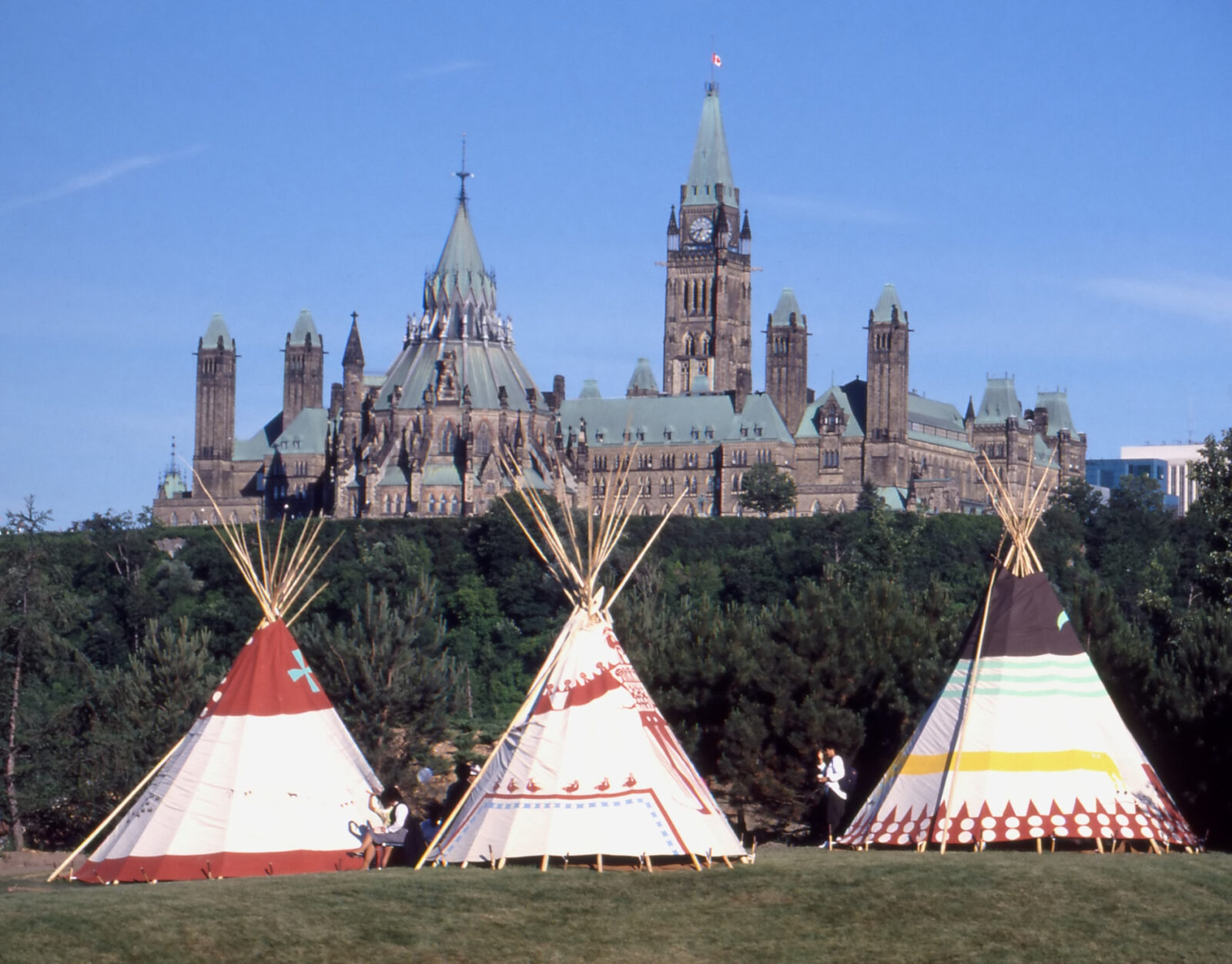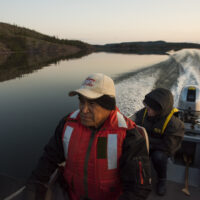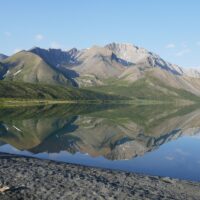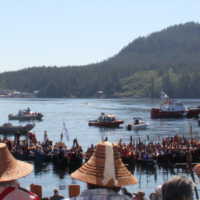Published as part of our Indigenous Perspectives series featuring Indigenous-led initiatives to address and respond to climate change.
Summary
This case study focuses on the way that climate policy in Canada is failing to appropriately build relationships with Indigenous people and incorporate Indigenous ways of knowing, and the need to decolonize Canada’s climate policy and address the violation of Indigenous rights in the framework that built it. The current policies in place are paraded around as a job well done, despite major violations in the government’s responsibility to Indigenous people. The 2016 Pan-Canadian Framework on Clean Energy and Climate Change and the updated 2020 plan, A Healthy Environment and a Healthy Economy, missed the mark on Indigenous inclusion, consultation, and accommodation, as the recent Indigenous Climate Action (ICA) report Decolonizing Climate Policy in Canada explains in detail.
Governments have a responsibility to build a climate plan that incorporates the best available information, and they can not do so without the inclusion of Indigenous generational knowledge. To include Indigenous knowledge, there is a level of respect and understanding that is required. To access this knowledge, Canada must decolonize by divesting its colonial power and approaching its relationship to this land’s First Peoples on a nation-to-nation basis focused on respect for the land and living well together, and do the hard work necessary in repairing the damaged relationship with this land’s First Peoples.
This case study offers an entry point into the efforts underway to decolonize climate policy in particular by addressing glaring issues within the Canadian government’s policy development process with regard to the meaningful involvement of Indigenous Peoples as rights holders. The process by which the climate policies were constructed has failed to see Indigenous Peoples as rights holders with agency and authority. Understanding and incorporating Indigenous ways of knowing is vital to addressing the climate crisis, and the way to access this information is to consult with Indigenous rights holders and respect the generational knowledge of their territories.
Moving forward, Indigenous-led initiatives need to be championed and listened to with the same respect and attention given to the scientific community. Indigenous relationship building will not have one linear path to follow and will take a lot of hard work and determination, with the onus on federal, provincial, and territorial governments.
Disclaimer
I would like to acknowledge all the efforts of our Indigenous communities and Nations in raising a collective cry regarding the injustice that our Sacred Earth has suffered. I want to acknowledge that this collective voice is created through conversations and relationship building, through ceremony and mutual respect, that in no way am I the lone voice and that I have the force of Ancestors speaking with me, through me, and with others. I can’t lay claim as a sole author on this case study, as it draws on a collective of strong Indigenous voices and experiences. When I speak of Indigenous Peoples, I use this in a collective sense to represent the First Nations, Inuit, and Métis. When I refer to Earth, I am doing so with the premise I am talking of an actual person that is capable of feeling, hurting and is very much alive and sentient. When I speak of my Ancestors, I am referring to the old ones, the ones that have gone on to the spirit realm, the ones whose physical bodies are no longer able to stand on our sacred Earth. I use the words in English in order to convey to you in the best way I can the intent and responsibility I have to the land, though even as I am learning, this language does not do it justice.
We must honour the Sacred. Ceremony is in all that we do.
Many of my most impactful life experiences have come from moments of understanding and connecting to the first and foremost love of my life, the land. As a young person I got to experience the beauty of the sacred land and was able to take, extract, and utilize all it had to teach me in a one-sided way. The years have taught me that anything of beauty, transcendence, and magnificence cannot remain this way for seven generations unless we nurture it and live in reciprocity. For me this looks like ceremony. For many Indigenous people this is the physical, spiritual, and deliberate act of ceremony. Ceremony is in all that we do, even the very languages we speak (Tssessaze, V. Personal Communication, February 14, 2021). It is through understanding this and acting on it that we can come to recognize the inherent duty to protect the sacred, to see how the Earth is a finely tuned system connected to our beings and everything that we do. We must honour the sacred (Whitecloud, 2021, 27:17).
I am sure you have heard it all before. I’m certain you have. As the resounding collective voice of Indigenous people across the world has said, the Earth is sacred, the Earth is an embodiment of our being and sustains us all (Bone, et al., 2012). We have cried out, protested, become educated in the ways of the settler colonial state in order for colonial governments to hear our plea in protecting the sacred. Though, much like my young self, they only see what they can take, a resource. This extractive approach to the land is not different from the extractive approach they took with our people. First by attacking our identity. Through disrupting our generational learning, it was thought they would be rid of “the Indian problem” (TRC, 2015). It is true, much damage was caused, and lineages of ancestral knowledge were lost, languages gone, and whole generations of Indigenous people violently erased from this physical world (Palmater, 2015). The settler colonial state failed to eliminate their Indian problem, but the damage they caused is still being mended today.
As with our oral history, they have only delayed our teachings, as it is through the language of the land and the language of our Ancestors in the spirit realm that we gather our collective strength. Our knowledge does not just come from our generational learning, it comes from ceremony and connection to this land (Tssessaze, V. Personal Communication, February 14, 2021). If my Elder were not here to teach me, my Ancestors would reach me. We are in tandem with this land and water, much like the heart that pumps the blood into your veins, your nervous system that triggers actions and reactions, and the brain that mediates your human experience. It is an important premise to understand that Indigenous people are stewards of this land. To understand each other, you must understand this (Wildcat, 2009).
Decolonizing climate policy is in no way a singular effort and cannot be limited to any one event or action. This fight has been born of many different advances all over our sacred Earth. Through this case study I will summarize the process of how I became a part of a team working to decolonize climate policies in Canada, as a contributor to Indigenous Climate Action’s report Decolonizing Climate Policy in Canada. Specifically, we found, the processes and policies enacted within the Pan-Canadian Framework and Healthy Environment and Healthy Economy policy documents entrench settler colonial relations and the outright exclusion of Indigenous people as rights holders and defenders of the land, all the while claiming to recognize “the importance of traditional knowledge in regard to understanding climate impacts and adaptation measures” (PCF, 2016 p. 3).
The façade of Indigenous engagement
The Pan-Canadian Framework had failed to engage in true nation-to-nation relationship with Indigenous Peoples, and to prioritize the intersectionality of climate issues to those most affected. It further extended its poorly imagined framework into the newly created Healthy Environment and Healthy Economy climate plan. Together, a team consisting of myself, Dr. Jen Gobby, Rachel Ivey, and Indigenous Climate Action found that these two documents violate Indigenous rights from the development process all the way through to content, plan, and policies (ICA, 2021 p.10). The report Decolonizing Climate Policy in Canada was developed through interviews with policy officials and employing a critical framework matrix, Intersectionality-Based Policy Analysis (Hankivsky, 2012), that aims “to critique and develop policy that contributes to transforming the inequitable relations of power that maintain inequality” (ICA, 2021).
Our analysis also took the federal plans and compared them to existing Indigenous documents asserting Indigenous rights such as the United Nations Declaration on the Rights of Indigenous Peoples, the Royal Commission on Aboriginal Peoples, the Truth and Reconciliation Commission’s Calls to Action, and the National Inquiry into Missing and Murdered Indigenous Women and Girls. ICA co-founder Eriel Deranger’s experience and frustrations with climate policies in Canada led to ICA’s collaboration with myself and Dr. Jen Gobby to address where climate plans in Canada are failing. In the next phase of Decolonizing Climate Policy in Canada, we will work to introduce Indigenous-led climate policy into Canada’s climate discourse.
The most glaring issue with these policy documents was the lack of Indigenous representation and the lack of transparency regarding how Canada’s climate policies were to be inclusive of Indigenous people. Additionally, Indigenous involvement in the engagement process was substandard at best, with “no descriptions or pathways of policy development to Indigenous communities, failing to provide Free, Prior and Informed Consent” (Deranger, E. Personal Communication. February 19, 2021).
The current policies showed that the exclusion of Indigenous people in building climate policy was the consequence of a lack of effort in relationship building. In seeking to summarize the process of being a part of a team analyzing federal policy in Canada, I investigated further the spark that led to this fire, as I had entered this project midway through. It was evident that there was not one event, but rather a collection of distasteful and outright disrespectful stories of engagement, consultation, and extraction of knowledge over many years. Though not outlined specifically in this case study, it does not take much investigation to find the stories of disrespectful engagement processes with Indigenous people.
The structure of the Pan-Canadian Framework was led by working groups that skirted real engagement and consultation. Even in the structure of developing these working groups, there was no Indigenous representation at these tables: the Decolonizing Climate Policy in Canada report found “Indigenous people were structurally excluded from the working groups” (ICA, 2021). Further, the main issue at the engagement level, seen all too often at different levels of government engagement, was the insufficient time allowed for a meaningful response (ICA, 2021). The very lack of Indigenous representation is at the heart of the problem. “This is not inclusion, this is tokenism” had been the response of Indigenous leaders to the Alberta policy that was used as a framework and best practice guide for the Pan-Canadian Framework (Deranger, E. Personal Communication. February 19, 2021).
Though the Pan-Canadian Framework and Healthy Environment and Healthy Economy have admirable climate targets, it is a gross understatement to say that they miss the mark on Indigenous engagement, inclusion, and accommodation (ICA, 2021). “Through my direct experience, there is zero interest, both provincially and nationally, to find ways of incorporating Indigenous rights and Indigenous knowledge in a tangible and real way to inform policy. Tangible solutions are built through relationships and built through hard work” (Deranger, E. Personal Communication. February 19, 2021). It was because of this experience that it became clear that a strong analysis and critique was needed on the development of federal climate policy. Indigenous engagement has been more about the optics and communications plan of government bodies than about just and meaningful relationship building.
The inclusion of Indigenous political bodies such as the Assembly of First Nations, Inuit Tapiriit Kanatami, and the Métis National Council does not constitute adequate consultation. Though it is an important first step to build relationships with Indigenous political bodies, engagement and relationship building start at the community level. Looking to the Indigenous political bodies further demonstrates the reluctance to disrupt the status quo in consultation (Wildcat, 2009). Indigenous generational knowledge is not housed in political bodies alone, it is with the people on the land. Further, engaging only political bodies on climate issues displays how much these governments undervalue Indigenous traditional knowledge and the years that are spent learning the land intimately. The findings in Decolonizing Climate Policy in Canada further support that the consultation with Indigenous political bodies was weak at best and did not include them as decision makers (ICA, 2021). Throughout our policy analysis of the Pan-Canadian Framework and Healthy Environment and Healthy Economy, it became evident that there was a lack of understanding and acknowledgement of the historical impacts and interconnectedness of Indigenous issues. The report finds, “The federal climate plans egregiously fail to address the fossil fuel industry as a driver of climate change, a violator of Indigenous rights, and a major contributor to the vulnerabilization of Indigenous communities and Nations by way of impacts on waters, lands, livelihoods and food systems,” (ICA, 2021 p.10).
Colonialism is at the root of Indigenous issues related to climate change; displaying them in the climate policy as mitigation solutions is inaccurate at best. Supporting ways to decolonize and disrupt the current policy-making habits is a step toward reconciliation. It is not to say that we do not have hard-working people in government bodies, in environmental organizations, and allies in the field of climate justice. The issues lie in the actual relationships between Indigenous people and settlers in Canada (Whyte, 2019). Environmental organizations are continually sought for their expertise on policy and rarely ever address their own organizational shortcomings. This is not to say they need to speak for Indigenous people, but instead should provide and hold the space to uplift Indigenous knowledge by Indigenous people by recognizing the space they are holding and asking if that space should have an Indigenous voice.
Addressing the inequalities in the very systems that maintain Turtle Island is quite literally a necessity. The failure to appropriately build relationships can no longer be acceptable practice, and frameworks that fail to address this need should no longer be used (Wildcat, 2009). It should also be noted that when attempting to understand the extractive drive behind the behaviour of settlers, that drive does not stop with all our relatives in the natural world, and all that our Sacred Earth has offered and continues to offer. It extends to the very knowledge of this land gifted to us over generations and the ceremonies that are used to heal this land. Broken relationships take time and effort to fix, and it starts with integrity (Whyte, 2019).
Failure to incorporate Indigenous ways of knowing and the interconnectedness of the sacred
The first step to meaningful consultation is repairing the relationships with Indigenous people, and giving respect to rights and authority. In order to do this, settlers need to stop assuming that Indigenous people will always be available to educate them on the sacred. We are tired. It is emotionally exhausting to be in a room filled with people who uphold the systemic racism, settler biases, and colonial ideologies that we have so long had to contend with. The unacknowledged work that Indigenous people are having to do to get a room up to speed on Indigenous ways of knowing is rarely if ever incorporated into the duty to accommodate, let alone Indigenous views on accommodation such as the spiritual offering of tobacco (McGregor, 2014). Policy frameworks such as the Pan-Canadian Framework and Healthy Environment and Healthy Economy want to say that they have consulted with Indigenous people. As an Indigenous person, I see no real evidence that consultation happened, only sentiments and empty words. This language used in both policies does not address the structural problems and power imbalances that the government upholds today.
As with the disclaimer at the very beginning of this case study, the understanding of sacred Indigenous ways of knowing is vital to a successful relationship, and the onus is on settlers to undertake the work, research, and conversations to develop that understanding. I often use analogies in my storytelling, as stories are often told to the young ones to teach them and help them to understand the history (Deloria, 2015). Canada is the bully and the abuser who has hurt Indigenous people and caused a rightful distrust. Now this bully and abuser is apologizing and demanding trust while doing the bare minimum to earn it.
Incorporating Indigenous ways of knowing is vital to understanding the oral history and generational knowledge of the land. There is a balance and interconnected nature that must always be honoured. The current disconnect with the sacred reinforces the colonial mindset of the hierarchy of power and the assumed right to extract (LaDuke, 2020). The indoctrination of religion has framed western science as outside of the realm of sacred. This disconnect of sacred and science can be seen through western science, which attempts to replace traditional knowledge with words like animism and epigenetics. It is through our generational knowledge and oral history that we know the Earth’s creations are alive and are sentient beings and that our knowledge is transitioned through our blood memory. Communication of that history starts to close those gaps. While it’s not expected that settlers study and learn the sacred, it is expected that this way of knowing will be given the respect and understanding it is due without attempting to squish it into colonial language and paradigms (LaDuke, 2020). Traditional knowledge and oral histories should be understood as valid in the same sense that the data and research of settler scientists is valid (McGregor, 2014).
Moving forward
The critique of the Pan-Canadian Framework and Healthy Environment and Healthy Economy presented in the report Decolonizing Climate Policy in Canada was produced in two phases. Phase One focused on analyzing the failures, from an Indigenous perspective, of the two documents. Phase Two of the project will focus on highlighting and giving space to Indigenous-led climate policy. To set the direction for Phase Two, we have created an Advisory Council of Indigenous experts from Canada’s five biomes, which will allow for the land to speak through them.
The formation of the Advisory Council came from identifying that all too often, consultations seek to take representatives almost exclusively from National Indigenous Organizations. In doing this, there is a perpetuation of the notion that First Nation, Inuit, and Métis representatives are homogenous and can speak for the hundreds of unique nations spread across Canada. This notion also reinforces who is Indigenous under the Indian Act, excluding many First Nations knowledge keepers who are not status Indians but who should be considered. This system of “inclusion” is problematic and does not directly seek all the unique Indigenous traditional and generational perspectives on climate mitigation initiatives.
Through the creation of an Advisory Council, we will be seeking to address this challenge by selecting the Council members based on the five distinct biotic ecosystems known as biomes of Canada. It was through this intention that the land would have a representative who transcends political, treaty, territorial, and language boundaries. There will be an Indigenous person who would represent the traditional biome, of which they have direct knowledge and community connections, ensuring the solutions are land focused. Additionally, we have added a youth representative. It is among Indigenous ways of knowing that we are continuing and making a place for our next generation of leaders. The Advisory Council, in collaboration with Indigenous Climate Action, will then produce commitments that are needed to have a just and meaningful climate policy for all Indigenous people and non-Indigenous people.
The path forward is stained with past failures and missteps, and no one person has the answer for achieving reconciliation in Canada. Reconciliation is a collection of initiatives and a balance of ideas, with space to incorporate a two-eyed-seeing perspective. This case study, this nehiyaw iskwew’s perspective, is focusing on the current government’s pitiful attempts to repair the integrity of relationship building with Indigenous people. That same government has the convenience of readily available English-language resources on how to build relationships with many nations, whereas my ancestors and teachers have had to, and continue to, struggle with translation that doesn’t leave them open for interpretation. As my teachers tell me, the work is never done.
Acknowledgment/ Kinanáskomitináwáw
To our life giver, Earth, for teaching me and guiding me.
I want to express my deepest gratitude to all the Elders and knowledge keepers who have guided me spiritually and through ceremony. Special mention to Victor Tssessaze who aided directly in the spiritual care of my words for this case study. I want to thank the team at Indigenous Climate Action for doing great and hard work for our Mother Earth, particularly Eriel Deranger and Lindsay Monture.
I want to thank Dr. Jen Gobby for being a beautiful ally in the work of decolonizing climate action and graciously bringing me on board to support the work of decolonizing climate policy. I also want to thank the Indigenous youth, who, against the odds, strive and continue the fight of our elders, land, and waters. With special mention to Carlie Kane who helped me immensely in this case study.
To my husband, Tyler, and my children Dominic, Zoe, and Elena. It is through your love I am nourished.
References
Bone, H., Courchene, D. &, Greene, R. (2012). The Journey of the Spirit of the Red Man: A Message from the Elders. Van Haren Publishing.
Deloria, V. (2015, May 7). Time of its Own—Clashing Worldviews at Devils Tower. YouTube. https://www.youtube.com/watch?v=syfLkkAQfBg
Environment and Climate Change Canada. (2016). Pan-Canadian Framework on Clean Growth and Climate Change: Canada’s Plan to Address Climate Change and Grow the Economy. Government of Canada. http://publications.gc.ca/site/eng/9.828774/publication.html
Environment and Climate Change Canada. (2020) A Healthy Environment and A Healthy Economy: Canada’s Strengthened Climate Plan to Create Jobs and Support People, Communities and the Planet. Government of Canada. https://www.canada.ca/content/dam/eccc/documents/pdf/climate-change/climate-plan/healthy_environment_healthy_economy_plan.pdf
Hankivsky, O. (Ed.). (2012). An Intersectionality-Based Policy Analysis Framework. Vancouver, BC: Institute for Intersectionality Research and Policy, Simon Fraser University.
Indigenous Climate Action, Gobby, J. & Sinclair, R. et al. (2021). Decolonizing Climate Policy in Canada. Indigenous Climate Action.
LaDuke, W. (2020). To Be A Water Protector: The Rise of the Wiindigoo Slayers. Fernwood Publishing.
Mcgregor, D. (2014). “Lessons for Collaboration Involving Traditional Knowledge and Environmental Governance in Ontario, Canada.” AlterNative: An International Journal of Indigenous Peoples, 10(4), 340–353. https://doi.org/10.1177/117718011401000403
Palmater, P., & Sinclair, N. J. (2015). Indigenous Nationhood: Empowering Grassroots Citizens. Fernwood Publishing.
Truth and Reconciliation Commission of Canada (TRC). (2015). Truth & Reconciliation: Calls to Action. United Nations, National Centre for Truth and Reconciliation, Truth and Reconciliation Commission of Canada, Truth and Reconciliation Commission of Canada, & United Nations.
Whitecloud, K. (2021, January 31). Ways of knowing: Connecting Spiritually with the Land and Each Other. [Video] YouTube. https://www.waysofknowingforum.ca/dialogue7
Whyte, K. (2020, January 1). Too late for indigenous climate justice: Ecological and relational tipping points. Wiley Online Library. https://onlinelibrary.wiley.com/doi/abs/10.1002/wcc.603
Wildcat, D. R. (2009). Red Alert!: Saving the Planet with Indigenous Knowledge. Golden, Colorado: Fulcrum.



